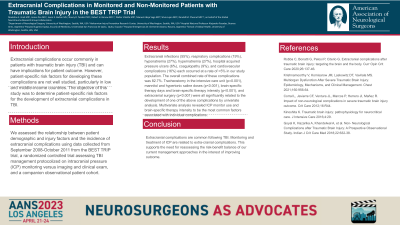Extracranial Complications in Monitored and Non-Monitored Patients with Traumatic Brain Injury in the BEST:TRIP Trial
Extracranial Complications in Monitored and Non-monitored Patients with Traumatic Brain Injury in the BEST:TRIP Trial
Friday, April 21, 2023


James Pan, MD
Resident Physician
University of Washington
Seattle, Washington, United States
ePoster Presenter(s)
Introduction: Extracranial complications occur commonly in patients with traumatic brain injury (TBI) and can have implications for patient outcome. However, patient-specific risk factors for developing these complications are not well studied particularly in low and middle-income countries. The objective of this study was to determine patient-specific risk factors for the development of extracranial complications in TBI.
Methods: We assessed the relationship between patient demographic and injury factors and the incidence of extracranial complications using data from the BEST TRIP trial, a randomized controlled trial assessing TBI management protocolized on intracranial pressure (ICP) monitoring versus imaging and clinical exam.
Results: Extracranial infections (55%), respiratory complications (19%), hyponatremia (27%), hypernatremia (27%), decubitus ulcers (6%), coagulopathy (9%), and cardiovascular complications (16%) each occurred at a rate of >5% in our study population. The overall rate of these complications was 82.7%. Tracheostomy in the intensive care unit (p=0.001), mannitol and hypertonic saline doses (p < 0.001), brain-specific therapy days and brain-specific therapy intensity (p < 0.001), and extra-cranial surgery (p < 0.001) were all significantly related to the development of any complication by univariate analysis. Multivariate analysis revealed ICP monitor use and brain-specific therapy intensity to be the most common factors associated with individual complications.
Conclusion : Extracranial complications are common following TBI. Monitoring and treatment of ICP are related to most frequent extra-cranial complications. This supports the need for reassessing the risk-benefit balance of our current management approaches in the interest of improving outcome.
Methods: We assessed the relationship between patient demographic and injury factors and the incidence of extracranial complications using data from the BEST TRIP trial, a randomized controlled trial assessing TBI management protocolized on intracranial pressure (ICP) monitoring versus imaging and clinical exam.
Results: Extracranial infections (55%), respiratory complications (19%), hyponatremia (27%), hypernatremia (27%), decubitus ulcers (6%), coagulopathy (9%), and cardiovascular complications (16%) each occurred at a rate of >5% in our study population. The overall rate of these complications was 82.7%. Tracheostomy in the intensive care unit (p=0.001), mannitol and hypertonic saline doses (p < 0.001), brain-specific therapy days and brain-specific therapy intensity (p < 0.001), and extra-cranial surgery (p < 0.001) were all significantly related to the development of any complication by univariate analysis. Multivariate analysis revealed ICP monitor use and brain-specific therapy intensity to be the most common factors associated with individual complications.
Conclusion : Extracranial complications are common following TBI. Monitoring and treatment of ICP are related to most frequent extra-cranial complications. This supports the need for reassessing the risk-benefit balance of our current management approaches in the interest of improving outcome.
